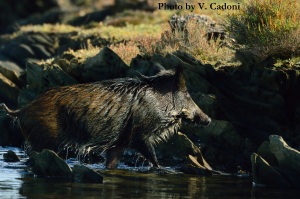Sardinian wild boar were probably introduced by humans in pre-historic times, probably in a phase of early domestication. Some animal probably escaped after introduction and established the wild boar population. Although being able to hybridise with the local domestic pig population until the development of modern breeding practices (see the hybridization page for more details) they are now distinct from both the domestic pig population and other wild boar populations, in Italy and elsewhere on the European continent. Their distinctiveness has been investigate both with Genomic markers (SNP) and microsatellites. SNP data are more abundant in the genome but less variable and carry the signature of both past and recent events and support the differentiation of the Sardinian population (see the scientific publication and the conference contribution for more details). These markers are still quite expensive and it is unlikely local administration can routinely use them for monitoring purposes.

Sardinian wild boar
Microsatellites are economically more affordable and concordantly showed the distinctiveness of the Sardinian wild boar population (see the scientific publication), but we also used them to address management problems (details in the contributions presented at workshop and conference). Despite agreeing on the differentiation of the Sardinian wild boar the two markers can have different implementation and can bring different perspectives, we investigated their level of concordance and presented the results in conferences in the UKs, France and Germany. But, of course, we cannot forget the role environmental conditions, presence of barriers and adaptation have on shaping a natural population evolutionary processes. So we also addressed this aspects and found the presence of barriers that led to the subdivision in 3 subpopulations with different genetic composition (see contributions to conferences in Sardinia, Italy, Germany and Poland for more information).
These reseaches recived founding from the Sardinian Regional Government, Fondazione Banco di Sardegna, Marie Skłodowska-Curie Action, USDA, European Union, European Research Council and by the Provincial Administration of Cagliari.